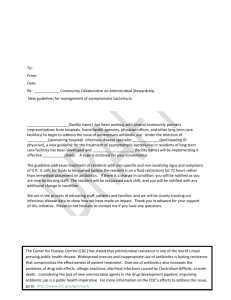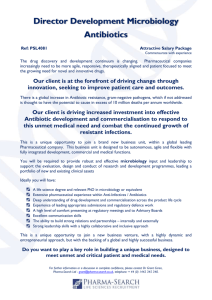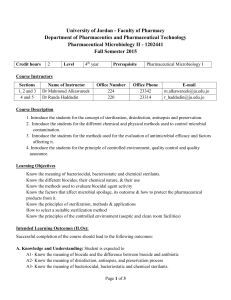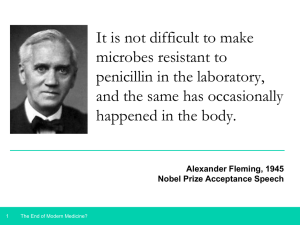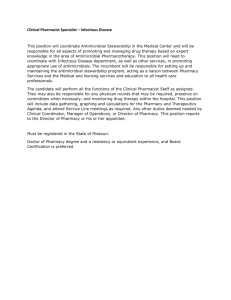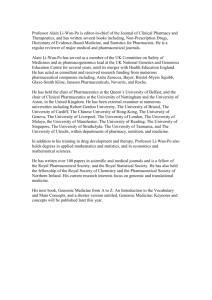Pharmaceutical microbiology and biotechnology
advertisement
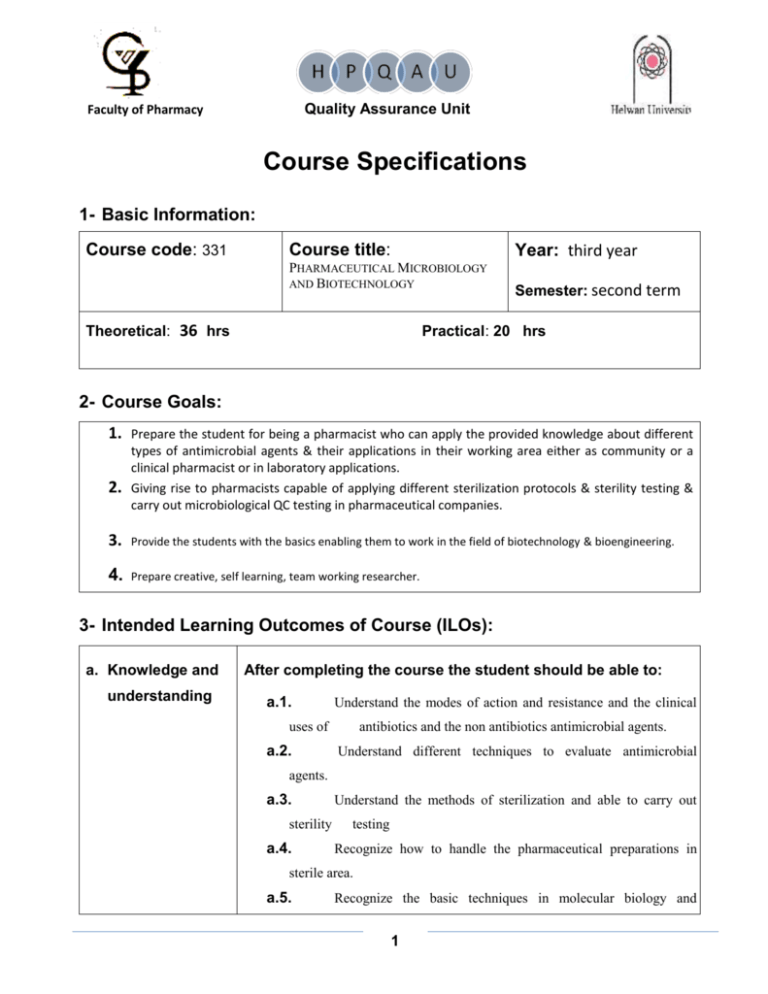
Quality Assurance Unit Faculty of Pharmacy Course Specifications 1- Basic Information: Course code: 331 Year: third year Course title: PHARMACEUTICAL MICROBIOLOGY AND BIOTECHNOLOGY Theoretical: 36 hrs Semester: second term Practical: 20 hrs 2- Course Goals: 1. 2. Prepare the student for being a pharmacist who can apply the provided knowledge about different types of antimicrobial agents & their applications in their working area either as community or a clinical pharmacist or in laboratory applications. Giving rise to pharmacists capable of applying different sterilization protocols & sterility testing & carry out microbiological QC testing in pharmaceutical companies. 3. Provide the students with the basics enabling them to work in the field of biotechnology & bioengineering. 4. Prepare creative, self learning, team working researcher. 3- Intended Learning Outcomes of Course (ILOs): a. Knowledge and understanding After completing the course the student should be able to: a.1. Understand the modes of action and resistance and the clinical uses of a.2. antibiotics and the non antibiotics antimicrobial agents. Understand different techniques to evaluate antimicrobial agents. a.3. sterility a.4. Understand the methods of sterilization and able to carry out testing Recognize how to handle the pharmaceutical preparations in sterile area. a.5. Recognize the basic techniques in molecular biology and 1 Quality Assurance Unit Faculty of Pharmacy molecular genetics (DNA recombination, PCR, DNA sequencing, tissue and cell culture) a.6. recognize applications of biotechnology in food & pharmaceutical products. b. Professional and Practical Skills After completing the course the student should be able to: b.1. Carry out antibiotic susceptibility testing. b.2. Evaluate antimicrobial agents (susceptibility of different types of microbes &determination of MIC). b.3. Design a microbiological assay method for antimicrobial agents. b.4. Sterilize different pharmaceutical preparations with the suitable sterilization method. b.5. Avoid the different sources of contamination and work using aseptic technique. b.6. Carry out sterility testing for sterile pharmaceutical products. c. Intellectual Skills After completing the course the student should be able to: c.1. Predict different sources of microbial contamination of different pharmaceutical preparations. c.2. Follow up the experimental techniques and predict the results. c.3. Observe different methods of DNA transfer & types of mutagens. c.4. predict suitable techniques used in industrial microbiology for production of biotechnological products.Design proposal for prevention & control of parasitic diseases. After completing the course the student should be able to: d. General and Transferable d.1. Report writing through interpretation asked on the results of the practical experiments. 2 Faculty of Pharmacy Skills Quality Assurance Unit d.2. Study independently to explore and browsing for a given search points & discus the search results with the lecturer. d.3. Solve problems in pharmaceutical industry especially in microbiological area. d.4. Improve student presentation skills through interactive presentations in selected scientific topics. 4- Course Content: 1. Introduction & Classification types of Antibiotics . 2. Mode of action of Antibiotics. 3. Bacterial resistance to antibiotics & clinical use of a antibiotics. 4. Non antibiotic antimicrobial agents & it’s classification Mode of action , Resistance. 5. Applications of non antibiotic antimicrobial agents &Evaluation. 6. Microbial spoilage types, kinetics of microbial death. 7. Sterilization techniques Heat Sterilization Cold Sterilization. 8. Validation of Sterilization process , sterility test. 9. Principles of Biotechnology (methods of fermentation & production of antibiotics). 10. Application of Genetic engineering. 11. Microorganisms in food & pharmaceutical products. 12. Human growth hormone,insulin & improvement of plant through biotechnology. 5- Teaching and Learning Methods: 1. Direct lectures (a1,a2,a3,a4,a5,a6, c3,c4) 2. Laboratory practical (b1,b2,b3,b4 ,c1,c2) 3. Seminar for small groups to presents the activity research points(c3,c4,d1,d2,d3,d4). 6- Student Assessment: 3 Faculty of Pharmacy Methods of Assessment Quality Assurance Unit Weighting Assessment Schedule % Practical exam 30 7th and 14th week Written Exam 50 15th week Oral Exam 20 15th week 7- List of Textbooks and References: Pharmaceutical microbiology & immunology 1. Course Notes: For third year students 2. Essential Books (Text Books): 3. Recommended Books: 4. Periodicals, Web Sites: Biology of microorganisms Pharmaceutical microbiology www.Pubmed.com 8- Required Facilities for Teaching & Learning: 1. Personal Computer (available for each staff member), 2. Power Point Displayer (Data-Show); easy available for the usual lectures and Labs. 3. Lecture Hall 4. Computer Hall with enough devices and internet connection 5. Meeting rooms for office hours 9- Matrices of knowledge and skills: 4 Faculty of Pharmacy Topics Quality Assurance Unit Number of weeks Knowledge and understanding Professional and Practical Skills Intellectual Skills General and Transferable Skills The or. Pract. 1 1 a1,a2 b1,b2,b3 c1.c2 d1,d2,d3,d4 1 1 a1,a2 b1,b2,b3 c1.c2 d1,d2,d3,d4 1 a1,a2 b1,b2,b3 c1.c2 d1,d2,d3,d4 1 1 a1,a2 b1,b2,b3 c1.c2 d1,d2,d3,d4 1 1 a1,a2 b1,b2,b3 c1.c2 d1,d2,d3,d4 1 1 a3,a4 b4,b5,b6 c1.c2 d1,d2,d3,d4 c1.c2 d1,d2,d3,d4 c1.c2 d1,d2,d3,d4 c2,c3,c4 d1,d2,d3,d4 1. Introduction & Classification types of Antibiotics . 2. Mode of action of Antibiotics. 3. Bacterial resistance to antibiotics & clinical use 1 of antibiotics. 4. Non antibiotic antimicrobial agents & it’s classification Mode of action , Resistance. 5. Applications of non antibiotic antimicrobial agents &Evaluation. 6. Microbial spoilage types, kinetics of microbial death. 7. Sterilization techniques Heat Sterilization Cold 1 a3,a4 Sterilization. 8. Validation of Sterilization process , 1 1 a3,a4 1 2 a5,a6 b4,b5,b6 sterility test. 9. Principles of Biotechnology (methods of fermentation & production of 5 Faculty of Pharmacy Quality Assurance Unit antibiotics). 10. Application of Genetic engineering. 1 1 a5,a6 c2,c3,c4 d1,d2,d3,d4 1 a5,a6 c2,c3,c4 d1,d2,d3,d4 1 a5,a6 c2,c3,c4 d1,d2,d3,d4 11. Microorganisms in food & pharmaceutical products. 12. Human growth hormone,insulin & improvement of plant through biotechnology. Teaching and Learning Methods 1. Direct lectures Knowledge and understanding Professional and Practical Skills a1,a2,a3,a4,a5,a6, Intellectual Skills General and Transferable Skills c3,c4 b1,b2,b3,b4,b5, b6 2. Laboratory practical c1,c2 3. Seminar for small groups to c3,c4 presents the activity research points. 6 d1,d2,d3,d3 Faculty of Pharmacy Student assessment methods Quality Assurance Unit Knowledge and understanding Professional and Practical Skills Intellectual Skills General and Transferable Skills 1. MCQ for assessment of theoretical learning. a1,a2,a3,a4,a5,a6 c1,c2,c3,c4 a1,a2,a3,a4,a5,a6 c1,c2,c3,c4 2. Oral examination for assessment of theoretical learning. 3. Practical examination b1,b2,b3,b4,b5, for assessment of the b6 skills Course Coordinator: Signature: Name: Head of Department: Signature: Name: Academic year: 2011/2012 Date: 7 d1,d2,d3,d4

